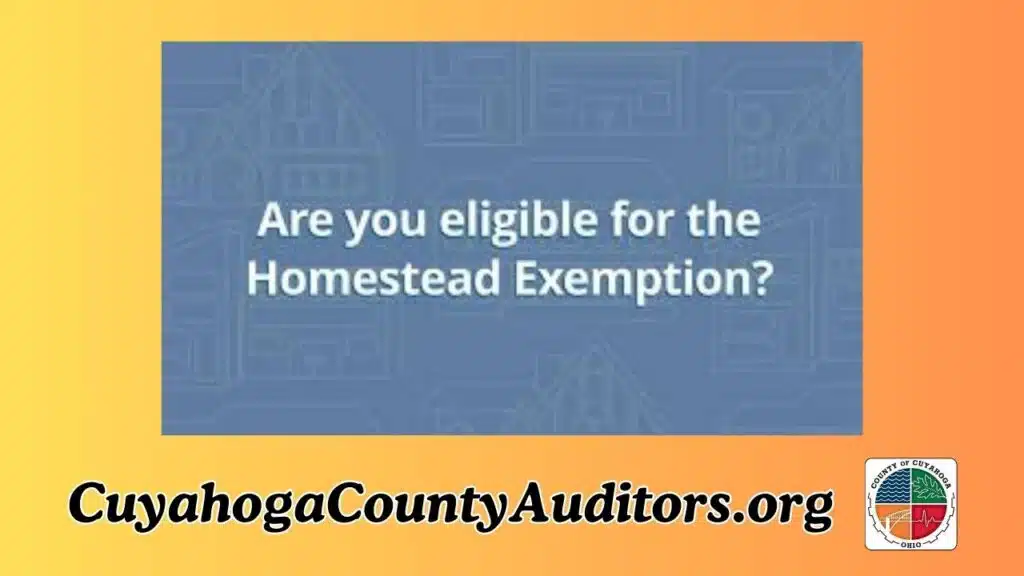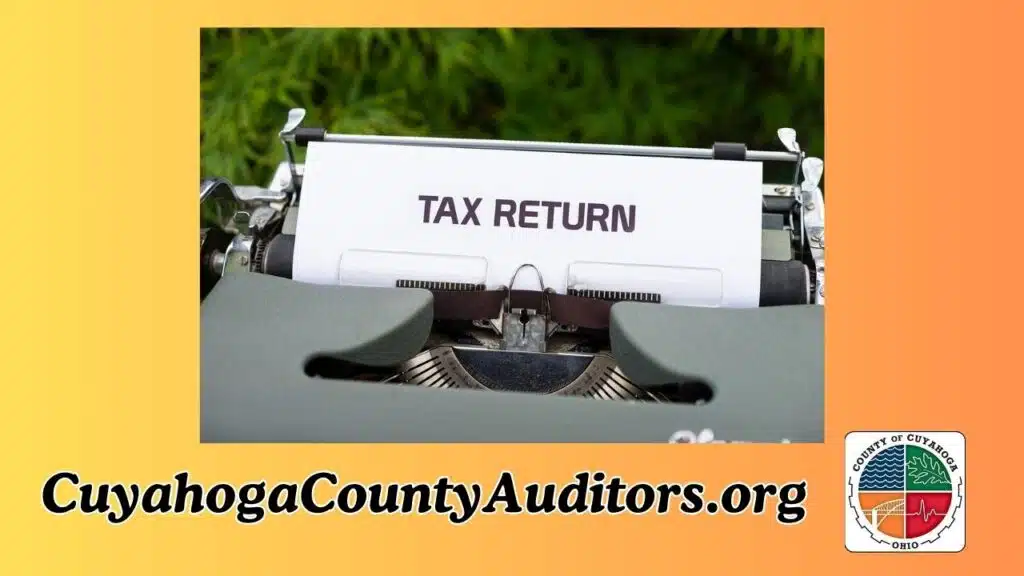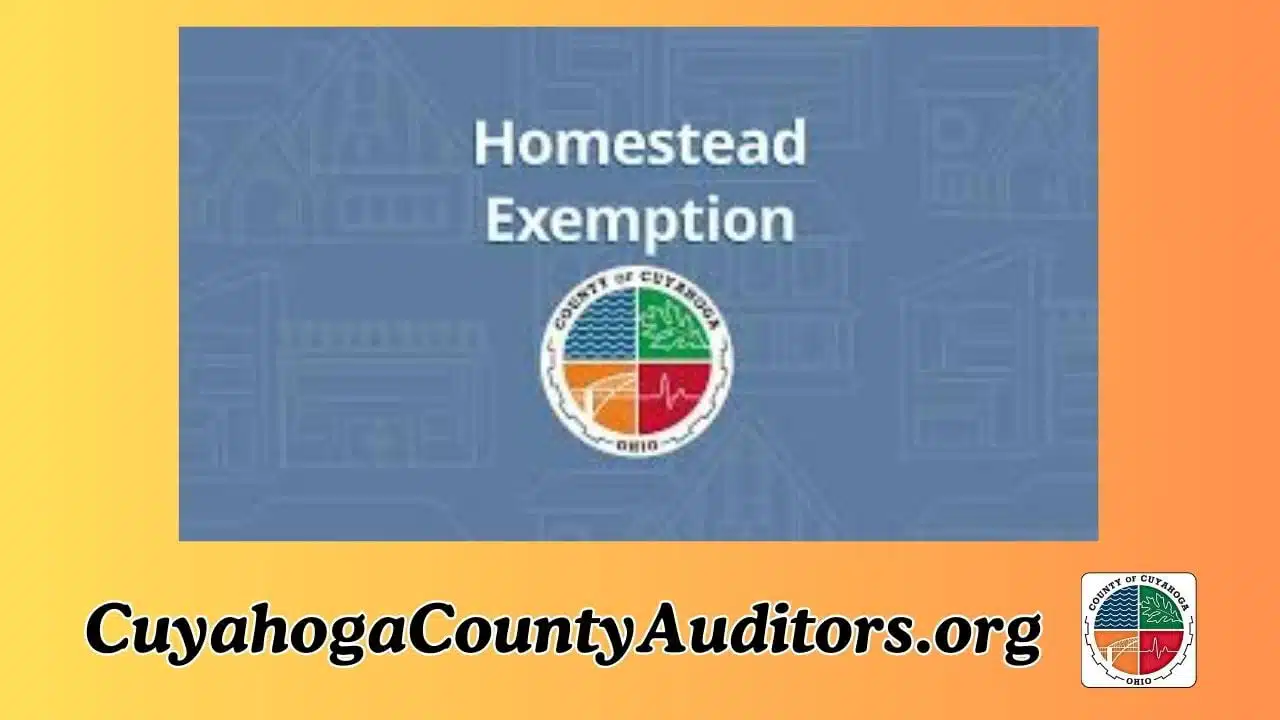The Homestead Exemption in Cuyahoga County helps homeowners pay less in property taxes. It makes owning a home more affordable by lowering the home’s taxable value.
This results in lower property tax bills. In this article, we’ll explain what the Homestead Exemption is, who qualifies, its benefits, and how to apply in Cuyahoga County.
What is the Homestead Exemption?
The Homestead Exemption is a tax break for homeowners in Ohio, including Cuyahoga County. It lowers the taxable value of your primary home. This can save you a lot on property taxes. It’s designed to help seniors, disabled individuals, and others who struggle with property taxes.
How Does the Homestead Exemption Work?
If you qualify for the Homestead Exemption, your home’s taxable value goes down. This means you’ll pay property taxes on a lower amount. For example, if your home is worth $100,000 and you get a $25,000 exemption, you’ll pay taxes on $75,000.

Eligibility for the Homestead Exemption in Cuyahoga County
Not everyone can get the Homestead Exemption. There are specific rules based on age, income, and disability. Here are the main things that decide if you qualify in Cuyahoga County.
1. Age Requirements
To get the exemption, you must be at least 65 years old or be totally and permanently disabled. This helps seniors and those with disabilities who may not have much income.
2. Income Limitations
There are income limits to qualify. For this year, your total income (including your spouse’s) can’t be more than $35,800. This ensures the exemption helps those who really need it.
3. Ownership and Residency
To qualify, you must own and live in the property as your primary residence. It can’t be rented out or used as a second home.
4. Property Value
The exemption is for single-family homes, condos, or manufactured homes that are considered real property in Ohio. It must be your primary residence and not a second home or investment.

Eligibility Criteria for the Homestead Exemption in Cuyahoga County
| Eligibility Factor | Requirement |
|---|---|
| Age | 65 years or older, or totally and permanently disabled |
| Income Limit | $35,800 or less for combined household income |
| Primary Residence | Must be the homeowner’s primary residence |
| Property Type | Single-family home, condo, or manufactured home |
| Ownership | Must be owned by the applicant |
Benefits of the Homestead Exemption in Cuyahoga County
The Homestead Exemption offers many benefits for eligible homeowners. Here are the main advantages of joining this program.
1. Reduced Property Taxes
The Homestead Exemption lowers your property taxes. This means you pay less in taxes. It’s a big help for seniors or those on fixed incomes.
2. Financial Relief for Seniors and Disabled Individuals
Seniors and disabled homeowners often struggle financially. The Homestead Exemption gives them tax relief. This helps them manage their living costs better.
3. Permanent Tax Reduction
Once you qualify for the Homestead Exemption, you keep getting the tax break. It stays with you as long as you’re eligible. This gives you ongoing financial relief.
4. Increased Affordability of Homeownership
The Homestead Exemption makes owning a home more affordable. It reduces your tax burden. This lets you use your money for other important expenses.
How to Apply for the Homestead Exemption in Cuyahoga County
Applying for the Homestead Exemption in Cuyahoga County is easy if you qualify. Here’s how to do it:
Step 1: Gather Required Documentation
Before you start, gather all needed documents. You’ll need:
- Proof of age (e.g., birth certificate, driver’s license)
- Proof of disability (if applicable)
- Proof of income (e.g., tax returns, Social Security statements)
- Deed or other proof of property ownership
Step 2: Complete the Application Form
You can find the application form on the Cuyahoga County Fiscal Officer’s website. Or, you can pick one up in person. The form will ask for basic info about your property and household.
Step 3: Submit the Application
After filling out the form, send it to the Cuyahoga County Fiscal Officer’s Office. You can apply online, by mail, or in person. Make sure to follow the instructions and include all required documents.
Step 4: Wait for Approval
The county will review your application. If you qualify, you’ll get a confirmation. The exemption will then apply to your property taxes for the next year.
Step 5: Renew Annually
You don’t need to reapply every year. But, you must tell the Fiscal Officer’s Office if your situation changes. This could be a change in income or property ownership.
Step-by-Step Guide to Applying for the Homestead Exemption
| Step | Action |
|---|---|
| Step 1: Gather Documentation | Collect proof of age, income, disability (if applicable), and property ownership |
| Step 2: Complete Application | Fill out the Homestead Exemption application form |
| Step 3: Submit Application | Submit the form to the Cuyahoga County Fiscal Officer by mail, online, or in person |
| Step 4: Wait for Approval | Wait for approval and confirmation of eligibility |
| Step 5: Renew Annually | Notify the Fiscal Officer if eligibility changes; no need to reapply annually unless status changes |
Common Questions About the Homestead Exemption
1. Can I apply for the Homestead Exemption if I rent my home?
No, the Homestead Exemption is for homeowners who live in the property. Renters can’t apply for it.
2. Will the Homestead Exemption reduce my entire property tax bill?
The exemption lowers the taxable value of your property. This can reduce your property tax bill. But, it might not cover the whole bill, depending on your home’s value and local taxes.
3. Can I transfer the Homestead Exemption to a new home?
If you move to a new home in Cuyahoga County, you might transfer the exemption. You must meet all the eligibility rules.
Conclusion
The Homestead Exemption in Cuyahoga County is a big help for homeowners. It lowers property taxes, making homes more affordable for seniors, disabled people, and those with low incomes.
If you qualify, applying for the exemption can save you money over time. Make sure to apply and renew your eligibility every year to keep getting these benefits.






